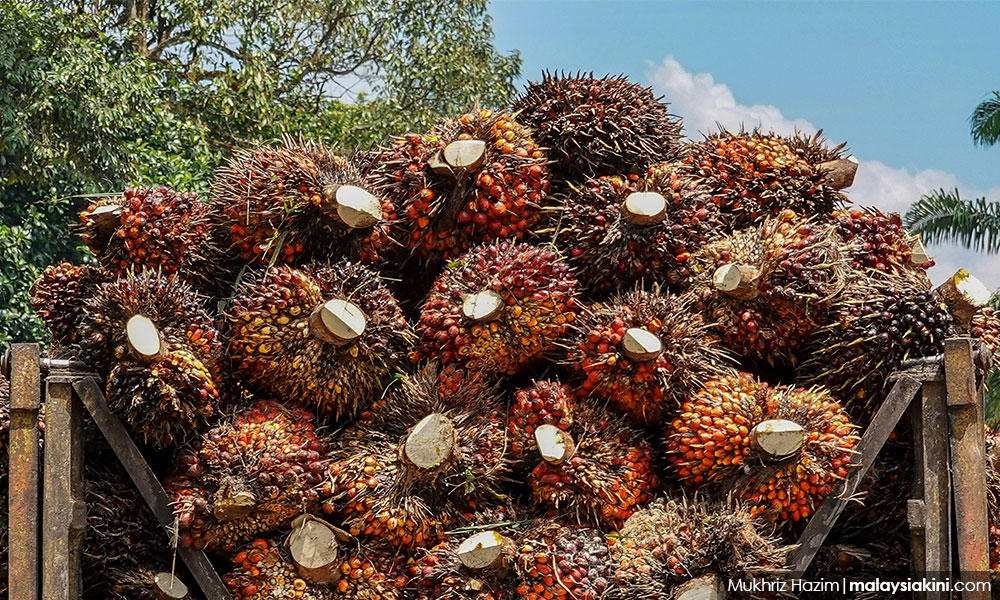LETTER | The European Union (EU) has been tough on the palm oil industry worldwide and not only on Malaysia.
The massive deforestation for oil palm cultivation a few decades ago has given negative publicity to this “golden crop” that is also one of the most competitive edible oil.
Although palm oil has many advantages over other cooking oils especially concerning yield per hectare and cost, the negative image of the industry as supporting large-scale clearing of forests in recent times has been difficult to overcome.
The EU should be appreciated for being serious with palm oil, agricultural and even livestock industries.
If not for its stringent regulations, Southeast Asia would have lost most of its forest cover like what has been happening in Brazil, and greatly contribute to global warming and climate change.
The oil palm is a big water guzzler, which could have negative effects on the environment
The government should not allow for more clearing of jungles for oil palm cultivation as Malaysia has already hit saturation point.
If one goes around the country, one can see thousands of acres of oil palms either too old to be productive or simply abandoned for various reasons. This is a big loss.
This being the case, how can the deforestation of an area as large as Putrajaya for oil palm cultivation in Pahang, according to recent reports, be justified?
Local tycoons should stop casting their greedy eyes on virgin forests and hoping to convert them into oil palm plantations!

Malaysia must ensure that there is no wastage or loss due to old oil palm trees not being replanted, the abandonment of productive trees for various reasons, or lack of harvesting due to the unavailability of workers.
With new and better clones that increase productivity, the government must ensure that all plantations and small holdings observe replanting programmes.
Those who don't, whether estates or smallholders, must be penalised.
There are already replanting and fertiliser subsidies for the industry and with record palm oil prices holding sway for years to come due to difficult natural and seasonal conditions, replanting should be commercially viable and profitable.
As if the pressure from the EU is not enough, our government’s policy concerning the recruitment of foreign workers is an even heavier burden on the industry.
Governments have come and gone but the same ridiculous policies and rules still abound - taxing and torturing the human resources department personnel of the plantation firms.
If these large plantation firms are facing such a tough time, just imagine the plight of the small-time entrepreneurs in recruiting workers!
Simplify migrant workers’ recruitment process
Local businesses had expected major changes from the unity government but find that the status quo still prevails. The government should offer more assistance to this vital industry.
Recruiting migrant workers should be made much easier as compared to the complicated process at present.
The palm oil industry must be given preference as it contributes a lot to our nation’s coffers, in terms of export revenue.
Additionally, there is also the windfall tax that benefits the government. One of the complaints by the palm oil industry is that it is not getting the right workers.
The rate of workers absconding is high. Malaysia cannot be dependent on Bangladesh and Indonesia only but needs to cast its net wider, especially in countries with agricultural and farming backgrounds.
As such countries in Africa, Central America, India and Myanmar should be considered. As long as workers follow work permit rules, it does not matter which country they come from.
Most migrant workers, however, prefer manufacturing industries and factories compared to working in rural, agricultural or even construction sectors.

As such, only those with a farming and agricultural background can stay long and work in the sectors such as oil palm, rubber, fruit, flower, vegetable farming, livestock and fisheries.
Plus, oil palm plantation workers must be paid attractive salaries and be given incentives such as housing, medical and other benefits to retain them, which employers can easily offer due to the high prices for palm oil.
It should not be a repeat of the glove industry's problems with the US Customs and Border Protection, which impounded the glove exports due to complaints of exploitation of workers during the pandemic.
It is no more like what it was during the 1950 and 1960s when estate workers, mainly Indians, were exploited to the hilt.
It is hoped that the various grouses concerning the recruitment of foreign workers will be comprehensively looked into and the process simplified for all Malaysian businesses, big and small.
If the immigration authorities are unable to cope, the government should appoint trustworthy contract firms to process the applications and help out in the short term.
Foreign workers have now become the lynchpin of the economy, and whether the economy goes into recession mode or booms very much depends on them.
The situation in the immigration offices and the hard-hitting criticisms by locals against this quagmire should be enough to justify an overhaul of the present system of recruiting foreign workers.
Malaysians expect a lot from Prime Minister Anwar Ibrahim and his government.
The views expressed here are those of the author/contributor and do not necessarily represent the views of Malaysiakini.

